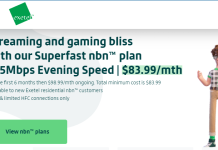If you’re like me, these last few weeks you’ve started working from home for the first time in forever. For the longest time, my internet connection was something which had to work first thing in the morning, during the evening, and over the weekends, and I didn’t much care what it did during the day.
Times have changed, though. I now need my internet connection to perform well pretty much all the time, unless I’m asleep. Like many households with home workers now, my internet connection has to handle:
- Video conference calls
- VPN traffic to the office, and to client sites so I can work on their facilities
- A VOIP phone so I can take calls (no mobile reception here)
- Streaming content – educational videos for home schooling, and Netflix/streaming in the evening
- A higher volume of emails, streaming radio, remote desktop, and so much more
In short, my internet connection is getting hammered, and many Australians are finding the same thing now too.
If you’re working from home, an NBN 50 connection is pretty much the starting point; this gives you good capacity to do your work while kids or others are watching TV, and it gives you good performance for video calls, remote desktops, VPNs and more. If you’re moving huge files around, an NBN 100 plan might be better, but most won’t need that.
So, with that in mind, here’s the best NBN 50 plans from our favourite providers for your delectation:
Aussie Broadband
Aussie Broadband is a team favourite, with a range of plans across NBN 25, 50 and 100 speeds (though there are faster plans available for those in select areas too!).
When comparing Aussie Broadband’s NBN 50 plans, there’s just $9 difference between 100GB and Unlimited plan, making that unlimited plan look pretty appealing right now. Other highlights are no lock-in contracts, so you can switch providers whenever.
Superloop
Superloop is our other team favourite, with local support, local branding and none of that big-brand “you’re a number not a member” feeling. With quick connection setups (as little as half an hour to an hour for some “churn” connections), Superloop offers a great sign-up experience, and one of the fastest typical evening speeds available.
As with Aussie Broadband, Superloop has a minimal price difference between its 500GB plan and Unlimited plan – just $5 to get as much data as you can use.
Belong
Belong is Telstra’s no-frills offering, and the pricing is extremely competitive, though you need to watch out for the cheaper plans which promise a lesser evening speed – just 30 Mbps during peak times.
Putting that to one side, the unlimited plans at $65/mo (on a 12-month contract) and $70 a month (with no contract, but $60 up front) are relatively good value compared to some other providers.
Internode
Internode started out as a small-ish ISP, but it’s now almost a household name, offering a range plans with pretty good typical evening speeds – around 43.5 Mbps on the NBN 50 plans.
While there are contract options, they’re just 6 months, making them relatively painless. The price advantage there is pretty good too – unlimited NBN 50 for just $59.99 a month for the first six months, noting it reverts to $79.99 after that. If you’re after a good price for your Work from Home / social isolation, this is one to consider – you can always change later!
Vodafone
Vodafone is a mobile carrier first, but has made the pivot into offering NBN broadband plans as well. Vodafone’s plans are popular amongst consumers for offering 4G backup so you can stay online even if your NBN connection drops out.
With just a single plan offering for NBN 50 speeds, the $75 a month asking price is pretty good considering the 4G backup, the contract-free nature and the competitive 42 Mbps typical evening speed.
How do you choose the best plan?
The best plan for you will be the one that fits your budget, meets your needs, and gives you whatever extras you may require. Thus, comparing the offerings above – and from other providers, this is just a short list – is a great idea.
Price is probably the most important element, but it also pays to consider typical evening speeds – this will give you a good picture of how your NBN connection will perform when most of your neighbourhood is online using it too.
Look at contract plan lengths, and whether there’s any up-front costs involved. Many providers offer contract-free plans nowadays, provided you have the equipment necessary to connect (a WiFi router, for example).




